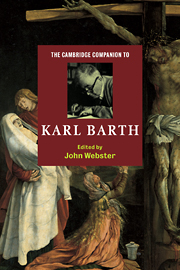Book contents
- Frontmatter
- 1 Introducing Barth
- 2 Theology
- 3 Revelation
- 4 The Bible
- 5 The Trinity
- 6 Grace and being
- 7 Creation and providence
- 8 Karl Barth’s Christology
- 9 Salvation
- 10 The humanity of the human person in Karl Barth’s anthropology
- 11 The mediator of communion
- 12 Christian community, baptism, and Lord’s Supper
- 13 Barth’s trinitarian ethic
- 14 Karl Barth and politics
- 15 Religion and the religions
- 16 Barth and feminism
- 17 Barth, modernity, and postmodernity
- 18 Karl Barth
- Index
5 - The Trinity
Published online by Cambridge University Press: 28 May 2006
- Frontmatter
- 1 Introducing Barth
- 2 Theology
- 3 Revelation
- 4 The Bible
- 5 The Trinity
- 6 Grace and being
- 7 Creation and providence
- 8 Karl Barth’s Christology
- 9 Salvation
- 10 The humanity of the human person in Karl Barth’s anthropology
- 11 The mediator of communion
- 12 Christian community, baptism, and Lord’s Supper
- 13 Barth’s trinitarian ethic
- 14 Karl Barth and politics
- 15 Religion and the religions
- 16 Barth and feminism
- 17 Barth, modernity, and postmodernity
- 18 Karl Barth
- Index
Summary
The doctrine of the Trinity is what basically distinguishes the Christian doctrine of God as Christian, and therefore what already distinguishes the Christian concept of revelation as Christian, in contrast to all other possible doctrines of God or concepts of revelation
(CD I/1, p. 301).Karl Barth's approach to the doctrine of God is manifest materially in his discussion of the doctrine of the Trinity, as also in the way in which he relates this doctrine to those of revelation, election, creation and reconciliation. To get to the heart of Barth's understanding of God, however, one is required to recognize its formal significance and, more specifically, the fact that his theology takes place within a church dogmatics. In contrast to so many major theological expositions in the history of thought, Barth refuses to treat the doctrine as if it had a self-contained locus within a 'systematic theology' or exposition of Christian doctrine. How Barth treats the doctrine of God and how he conceives the whole task of dogmatics are irreducibly interrelated. It is this interrelationship which constitutes perhaps the most distinctive facet of his whole approach and with which one must begin.
- Type
- Chapter
- Information
- The Cambridge Companion to Karl Barth , pp. 72 - 91Publisher: Cambridge University PressPrint publication year: 2000
- 7
- Cited by

